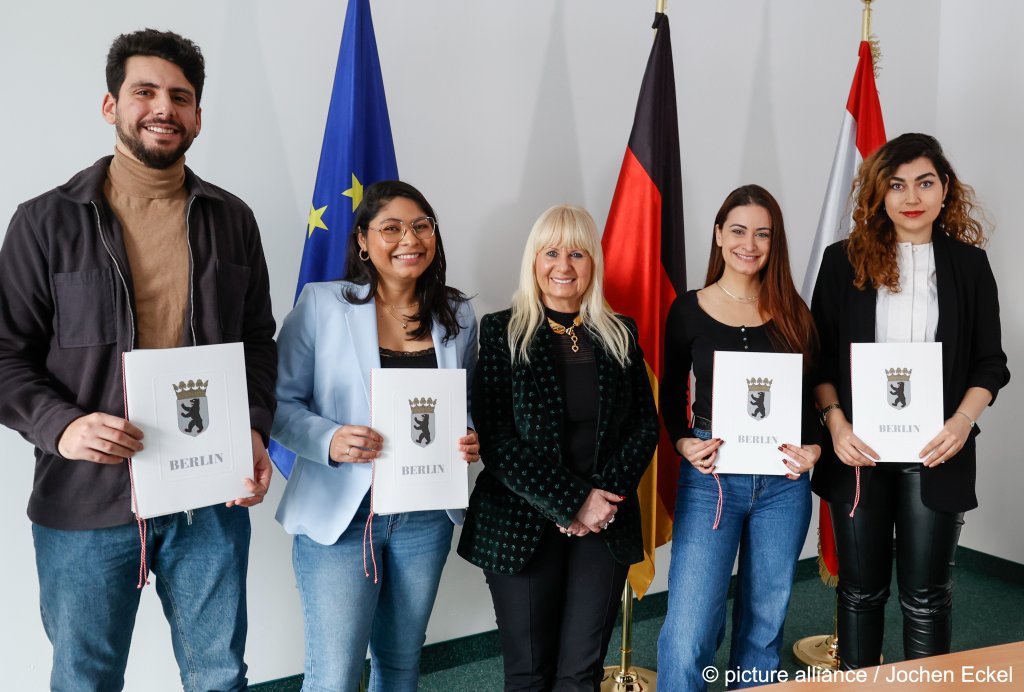The reformed citizenship law with a dual passport for all is taking effect in Germany this week. As a result, more people will be eligible to become German citizens. InfoMigrants answers the most important questions about the law.
Around 14 percent of Germany's population -- that's roughly 12 million people -- don't have German citizenship. Despite approximately 5.3 percent of the population having lived in Germany for at least ten years, according to the federal government, Germany's naturalization rate is only half the EU average.
This could change starting this Thursday (June 27), when a substantial part of the legislative reform of Germany's citizenship law comes into force -- seven months after the first reading of the draft law in the Bundestag, the German Parliament.
As of this week, naturalization will be possible after five years instead of the previous eight and multiple citizenship is generally permitted, among other things. Here's what the changes mean for migrants and asylum seekers.
What's the reform about?
According to Germany's Federal Interior Ministry, the law reform rests on these five main pillars:
- Naturalization is to be accelerated
- Multiple nationality to become generally possible
- Special achievements will be rewarded
- Easier acquisition of birthright citizenship
- Recognition of lifetime achievements of the 'guest worker' generation
More people are entitled to be naturalized
- Foreigners who have lived in Germany for five years will be able to begin to apply for citizenship, down from eight years.
- For those who are married to German citizens, the waiting time is reduced to four years.
- Applicants who demonstrate "special integration achievements" can even reduce the time they have to wait to be naturalized to three years. Such achievements include good performance at school, a job, good language skills or voluntary work.
- In 2022, close to a quarter of Germany's population had a migration history, according to the Federal Statistical Office.

Applicants no longer have to give up their previous nationality
- Starting June 27, multiple citizenship is generally permitted.
- Going forward, all naturalization applicants will be able to retain their previous citizenship without restriction when acquiring German citizenship, according to the Interior Ministry.
- Henceforward, the citizenship law of people's home countries will dictate whether people can retain their previous citizenship or whether they have to give it up.
- German citizens acquiring an additional citizenship can keep their German citizenship just like that.
- People from most countries in the world will be allowed to retain their original passport when they acquire German citizenship. Previously, this was mostly only available to fellow EU member states.
Easier acquisition of citizenship
- The legislative reform will benefit newborns in particular: In future, all children born in Germany to foreign parents will "unconditionally acquire German citizenship," according to the Interior Ministry.
- Moreover, German-born children can now retain their parents' citizenship if one of them has legally lived in Germany for at least five years (down from eight years).
- In legal terms, this means Germany is moving from jus sanguinis (Latin for right of blood), whereby nationality is determined by the parents' nationality, to jus soli (Latin for right of the soil), commonly referred to as birthright citizenship.
Read more: How long until you can apply for citizenship?
Which reliefs apply to the 'guest worker generation'?
- As of this week, so-called guest workers only need proof of oral language skills to become a German citizen; a naturalization test is no longer required. During the test, they have to demonstrate that they can "communicate in German in everyday life without any significant problems," according to the Interior Ministry.
- This easing of the rules is to "recognize the lifetime achievements" of the guest workers and the spouses who joined them over time.
- All of this also applies to so-called contract workers who came to the former GDR and their spouses who joined them at the same time.
- So-called guest workers (Gastarbeiter), many of them from Turkey, mostly started arriving in Germany from the 1950s onwards to help rebuild the country from the rubble of World War Two. Until now, they would have had to renounce their Turkish citizenship in order to acquire German.

Restrictions and rules
- According to the Interior Ministry, applicants for naturalization must not have a criminal record -- with one exception:
- So-called minor offenses, which include sentences of less than 90 daily rates or prison sentences of up to three months on probation, provided this has been issued after the probation period has expired.
- However, there is an exception from the exception: if an immigrant has been convicted of an "antisemitic, racist or other inhuman act," they cannot be naturalized -- regardless of the length of the sentence.
- To be entitled for naturalization, foreign nationals must be able to secure their own and their relatives’ livelihoods; moreover, they must not receive any government welfare (according to the Second or Twelfth Book of the Social Code (SGB II or XII).); however, there are three exceptions to this rule.
- Asylum seekers who have managed to remain in Germany for a long time due to a ban on deportations to their home country (so-called Duldung) also don’t qualify.
- The naturalization test was recently expanded and now requires a commitment to "Germany's special historical responsibility" for the Holocaust and its consequences, "in particular for the protection of Jewish life" and the right of the State of Israel to exist.
- Revocation of naturalization: Before the reform, a citizenship could be nullified within ten years if it was "obtained under false pretenses, by threat or bribery or by deliberately providing incorrect or incomplete information". As of this week, this includes incorrect statements concerning the commitment to Germany's free and democratic basic order, according to news agency AFP.
How many people are naturalized in Germany every year?
According to a survey by Migration Media Service among the 50 largest cities in Germany, at least 204,000 applications are being processed at present -- more than all naturalizations in Germany in 2023 combined. In Germany's second-largest city Hamburg, for instance, around 25,600 people are currently waiting for their naturalization application to be processed.
Last year, 19 percent more naturalization applications were submitted than in 2022 and more than twice as many as in 2020.
What's more, the naturalization authorities expect significantly more people to apply to become German citizens in the near future. This is due to the new rules adopted by the coalition government.
According to the dpa news agency, which recently conducted a survey among state governments and municipal administrations, the naturalization authorities have been receiving "many inquiries for weeks" about the multiple citizenship part of the law. In order to cope with the expected increase in the number of naturalization applications, they are focusing primarily on digitalizing the process, dpa reported.
According to Migration Media Service, Syrians made up the largest group of applicants in almost all cities it surveyed, followed by Iraqis and Turkish people. Other important groups last year were Iranians and Afghans.
Will the reform last?
Conservative opposition party CDU/CSU, by far the most popular party in the recent EU elections, wants to reverse the reform should the majority in the German Parliament after the next election make this possible.
The next federal elections are expected to take place in late summer or fall 2025.
Sources used / additional links:
- For more information about the reformed citizenship law, check out these questions and answers (in German) as well as these general information about the citizenship law on the Federal Interior Ministry website.
- Migration Media Service's overview of pending naturalization applications in Germany
